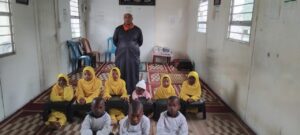By Thandile Kona
The sixth annual Shamima Shaikh Memorial Lecture took place last week at the Iziko Slave Lodge Museum in Cape Town. This year’s lecture, under the topic, ‘Breaking the Silence on gender based violence in the Muslim Community” was delivered by activist, Fatima Shabodien.
As has become the norm with the lecture series, the topic was meant to address current issues and stimulate debate within the Muslim community on issues that the community routinely sweeps under the carpet or falsely deem itself immune from.
Chaired by Seeham Samaai, the lecture also explored and problematized the situating of the lecture on the so-called “slave lodge” that was one of the first sites of the abuse, violation and rape of women.
Fatima began her talk by dispelling the notion that the Muslim community does not have a gender based violence problem and that Muslim women are not talking about it. On the contrary, she said, the Muslim community is not unique from the rest of the South African society and that Muslim women have been talking about gender based violence, but no one has been listening.
She placed a major part of the problem on religious institutions that are sites of toxic masculinity and have been drivers of the crisis and secondary victimisation of women. She stressed the need for the transformation of these institutions and for men to look into themselves in an attempt to address the crisis. The default response by men has been to look around for monster men to put the blame on and neglect to examine their own role and complicity in the perpetuation of patriarchal values.
Defiance
Drawing on the Islamic tradition of storytelling and memorialising, Fatima stressed the importance of remembering people like Shamima Shaikh as an act of defiance and a refusal to forget. It is a link to the past and a means to contextualise and make sense of the present in order to find solutions to current problems.
She located the genesis of gender based violence in the home where the girl and boy child often made to conform to roles that enforce the notion that men are superior to women and that women cannot be trusted with making decisions and need men as guardians. This shapes and informs the nature of power relations between men and women in the community.
This has led to women facing violence to levels equivalent to that of war zones. That explains the feeling by women of being under siege and constantly fearing for their lives. Even the institutions that are meant to protect women, like the police services; have become places where women face further victimisation. The dysfunctionality of the criminal justice system exacerbates the problem.
Due to South Africa being a largely religious country, the clergy has an important role to play in addressing the crisis. Unfortunately, that has not been the case. Often women become the ones who get interrogated when they come out to report abuse at the hands of their partners. The focus of the interrogation should be on the perpetrator, the man who abuses.
Like racism, patriarchy often co-opts its victims to be its most fervent supporters. That explains its power to reproduce itself and thrive. Therefore women cannot be blamed for the abuse they suffer at the hands of men.
The importance of examining the frames through which we look at our religion will help us make sense of the problem and come up with solutions. The placing of the societal moral responsibility on women and denying them their agency is at the root of the problem.
Fatima called on all of those present to pay tribute to Shamima by committing to adopting a bit of madness, like Shamima, in order to effect the changes that are needed in the Muslim community.
By Thandile Kona, President of Muslim Youth Muslim (MYM) of South Africa


